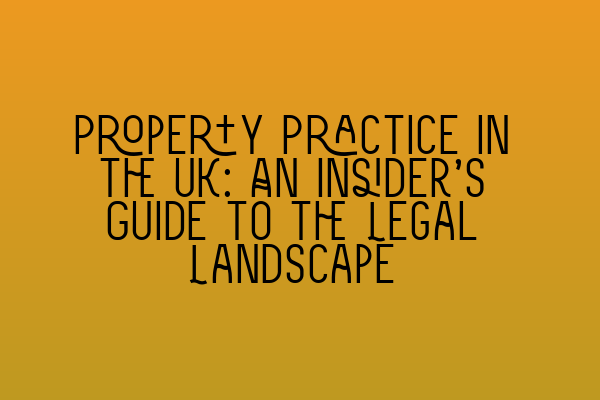Property Practice in the UK: An Insider’s Guide to the Legal Landscape
Are you planning to buy or sell a property in the UK? Or perhaps you’re interested in pursuing a career in property law? Whatever your reasons may be, understanding the legal landscape of property practice in the UK is crucial. In this comprehensive guide, we’ll take an in-depth look at the key aspects of property law and how it affects individuals, businesses, and the overall real estate market in the UK.
What is Property Law?
Property law is a branch of law that deals with the rights, interests, and obligations that individuals and businesses have in relation to real property. Real property refers to land and any permanent structures attached to it, such as houses, commercial buildings, and estates. Property law encompasses a wide range of legal issues, including ownership, transfer, leases, mortgages, easements, and more.
Importance of Property Law
Property law plays a crucial role in protecting the rights and interests of individuals and businesses. It provides a framework for property owners to assert their ownership rights, resolve disputes, and enter into legally binding agreements. Without property law, the real estate market could become chaotic and unreliable.
Furthermore, property law serves as the foundation for economic development and growth. It provides individuals and businesses with the confidence to invest in real estate, knowing that their rights will be protected by the legal system. This, in turn, contributes to overall economic stability and prosperity.
The Role of a Property Lawyer
When dealing with property matters, it is advisable to seek the assistance of a property lawyer. A property lawyer is a legal professional who specializes in property law and can provide expert advice and guidance throughout the property transaction process.
A property lawyer can assist with various tasks, including:
- Conducting due diligence: A property lawyer will examine the legal title of the property, review any relevant contracts or agreements, and ensure that there are no hidden or undisclosed issues that could affect the transaction.
- Preparing and reviewing contracts: A property lawyer will draft and/or review contracts to ensure that all terms and conditions are fair, legally valid, and protect the client’s rights.
- Negotiating terms: A property lawyer can negotiate on behalf of the client to secure favorable terms and conditions in the property transaction.
- Handling the exchange and completion: A property lawyer will oversee the legal process of exchanging contracts and completing the transaction, ensuring that all necessary documentation is prepared and signed.
- Resolving disputes: In the event of a dispute arising from a property transaction, a property lawyer can provide legal representation and seek resolutions through negotiation, mediation, or litigation if necessary.
To ensure a smooth and legally sound property transaction, it is highly recommended to engage a qualified property lawyer who has a deep understanding of property law and the intricacies of the UK legal system.
Key Concepts in Property Law
In order to navigate the complexities of property law, it is important to familiarize yourself with some key concepts:
- Freehold and Leasehold: Property ownership in the UK can be divided into two main categories: freehold and leasehold. Freehold ownership grants the owner absolute ownership of the property and the land it stands on, while leasehold ownership grants the owner the right to occupy the property for a specified period under the terms of a lease agreement.
- Land Registration: To establish legal ownership and protect property rights, it is crucial to register land with the Land Registry. Land registration provides certainty of ownership, facilitates the smooth transfer of property, and enables interested parties to conduct searches to gather important information about a property.
- Covenants: Covenants are legally binding obligations that run with the land, meaning they continue to bind subsequent owners of the property. They can be positive (requiring certain actions) or negative (restricting certain actions), and may be found in deeds or other legal documents.
- Easements and Rights of Way: Easements and rights of way grant certain rights to individuals or entities over another person’s land. Easements can include rights such as access, drainage, or light, while rights of way allow for passage over a specific route or area.
- Mortgages: A mortgage is a type of loan secured against a property as collateral. If the borrower fails to repay the mortgage, the lender has the right to take possession of the property and sell it to recover the outstanding debt.
Stay Informed with SQE Property Law & Land Law
At SQE Property Law & Land Law, we understand the importance of staying up-to-date with the latest developments in property law. Our team of experts regularly publishes insightful articles and resources to help individuals, businesses, and legal professionals navigate the complexities of property practice in the UK.
For more information and expert insights on property law, we recommend checking out the following related articles:
- Understanding Contractual Capacity: Rights and Limitations
- Interactive SQE Mock Tests for Contract Law: Test Your Knowledge
- Join Our SQE Contract Law Webinars: Expert Insights and Guidance
- SQE Prep: Mastering the Essentials of Contract Law
- Contractual Capacity: Understanding Legal Competence in Contracting Parties
By staying informed and educated, you can make informed decisions, protect your rights, and ensure a successful outcome in any property transaction or legal matter.
Disclaimer: The information provided in this article is for general informational purposes only and does not constitute legal advice. For specific advice tailored to your individual situation, it is advisable to consult with a qualified property lawyer.
